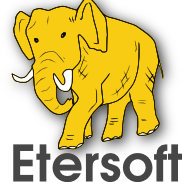
- Лицензия
- GNU AGPLv3
- Project Website
- github.com
- Report an Issue
- github.com

EPM is a package management command that has the same interface on all systems. With an interface similar to rpm, apt and urpm, it performs the necessary operations on any platform.
EPM can be installed using the terminal:
su -
apt-get update
apt-get install eepm| Command description | EPM Command | Command for ALT Linux |
|---|---|---|
| Installing a package by name on the system | epm -i (package) | apt-get install (package) |
| Installing the package file on the system | epm -i (package file) | apt-get install (package file) |
| Removing a package from the system | epm -e (package) | apt-get remove (package) |
| Searching for a package in the repository | epm -s (text) | apt-cache search (text) |
| Checking the presence of a package on the system | epm -q (package) | rpm -qa (pipe) grep (package) |
| List of installed packages | epm -qa | rpm -qa |
| Search by names of installed packages | epm -qp (word) | grep (word) |
| File affiliation with (installed) package | epmqf (file) | rpm -qf (file) |
| List of files in (installed) package | epm -ql (package) | rpm -ql (package) |
| Display package information | epm -ql (package) | apt-cache show (package) |
| Update distribution | epm upgrade | apt-get dist-upgrade |
To display information about the system, enter in the terminal:
epm print infoExample of system information output
distro_info v20230406 (EPM version 3.60.5-alt1) : Copyright © 2007-2023 Etersoft
Pretty name (--pretty): ALT Regular (20240112) (Sisyphus)
(--distro-name / --distro-version): Sisyphus / 20240112 (orig. Sisyphus 20230819)
Base distro name (-d) / version (-v): ALTLinux/Sisyphus
Vendor distro name (-s) / Repo name (-r): alt / Sisyphus
Package manager/type (-g/-p): apt-rpm / rpm
Base OS name (-o) / CPU arch (-a): linux x86_64
CPU norm register size (-b): 64 bit
Virtualization (-i): (host system)
CPU Cores/MHz (-c/-z): 16 / 1393 MHz
System memory size (-m): 15412 MiB
Running service manager (-y): systemd
Bug report URL (--bug-report-url): https://bugs.altlinux.org/:::
EPM Play is a tool that allows you to automatically install and remove packages using prepared scripts, without using third-party repositories.
epm play [options] [argument]To install an application, use epm play <app>:
epm play telegramИнформация
To get the current list of applications, use the epm play command in the terminal or visit the site
To install an alternative version of the application:
epm play telegram = betaTo get a list of alternative versions possible for installation, use the --product-alternatives option:
epm play --product-alternatives telegramTo remove an application use epm play --remove <app>:
epm play --remove telegramВозможно удалить приложение используя пакетный менеджер:
epm -e TelegramTo update an application in EPM Play use the --update option and the application ID:
epm play --update telegramTo update the list of installed applications, use the --update option and the all argument:
epm play --update allAn alternative method for updating the application is to reinstall the application:
epm play telegramGet a list of applications available for installation:
epm playGet a list of installed applications:
epm play --listВнимание
If the application identifiers match, the list will contain applications installed using the apt-get package manager
Get a list of installed utilities:
epm play --list-scriptsИнформация
Utilities are a group of installation scripts that automatically install or remove: drivers, development tools and other system applications of various types.
Get a complete list of applications and utilities:
epm play --list-allTo get a list without application/utility descriptions, use the --short option, works with the following [--list|--list-scripts|--list-all] options:
epm play --short --list-allCheck if the application is installed using the --installed option and the application ID:
epm play --installed telegramTo get a list of alternative versions possible for installation, use the --product-alternatives option and the application identifier:
epm play --product-alternatives telegramEPM Repack is a tool that allows you to convert (repack) packages from third-party manufacturers into the RPM standard of the ALT operating system family
| Package manager | Distribution |
|---|---|
rpm | ASPLinux, SUSE (+ Enterprise Desktop/Server), Mandriva, ROSA, Mandrake, PCLinuxOS, Fedora, Red Hat (+ Enterprise), Scientific, CentOS |
deb | Debian, Ubuntu, Mint, Runtu, mcst |
tgz | Slackware, MOPSLinux |
tbz | FreeBSD |
tbz2 | Gentoo |
apk | Alpine |
pkg.gz | SunOS |
Let's install the deb application using the epm repack utility:
epm repack tonfotos.deb
epm -i tonfotos-1.6.5-epm1.repacked.2.x86_64.rpmAn alternative input is:
epm -i tonfotos.debWhen installing a package, epm will automatically detect that the installed file is not a standard one and run the epm repack command, and after repacking the package, it will automatically install the repacked package.
Информация
First download the deb package on the manufacturer’s official website. Go to the folder with the downloaded Tonfotos program, in my case:
cd DownloadsTo install and remove applications from the epm play directory using the graphical interface, we recommend using appinstall
appinstall can be installed using the terminal:
su -
apt-get update
apt-get install appinstallepm -i appinstall